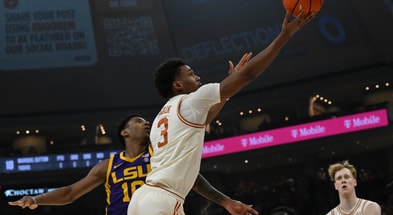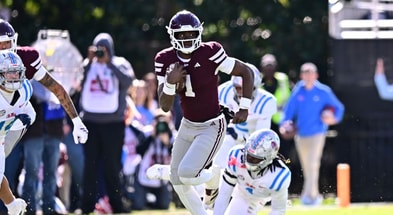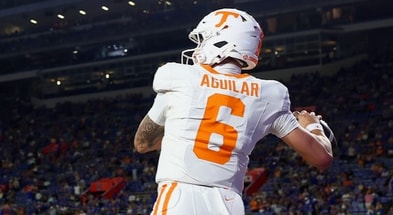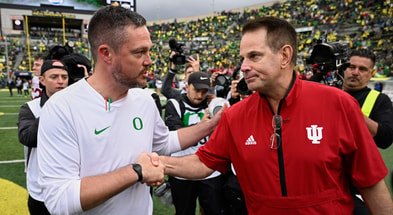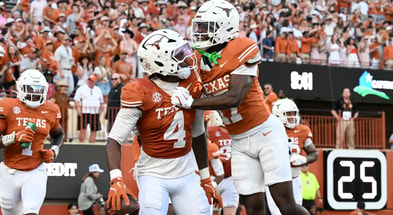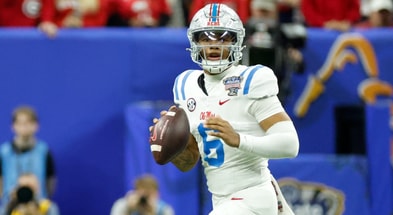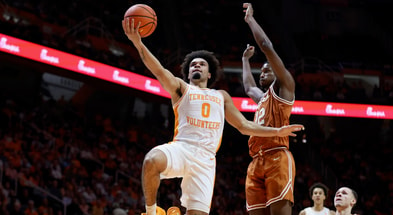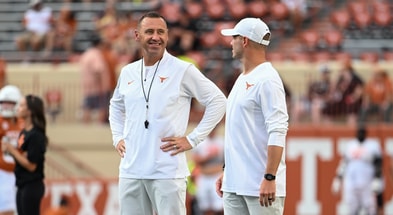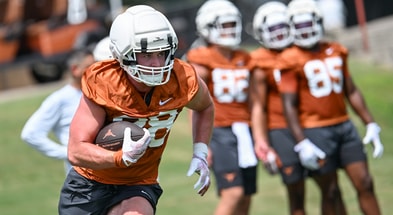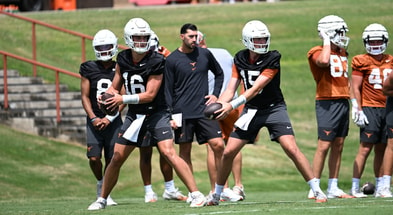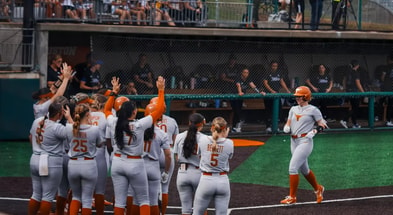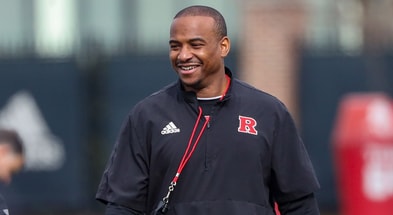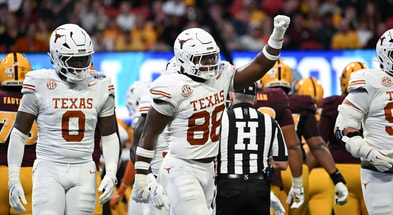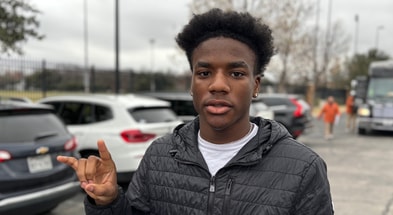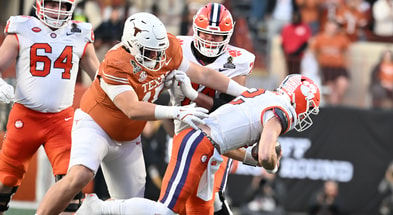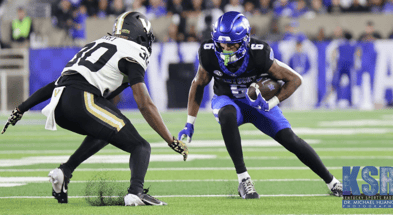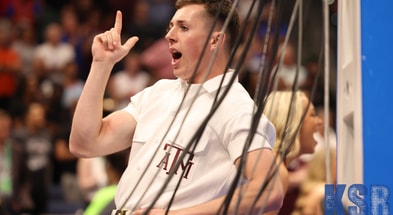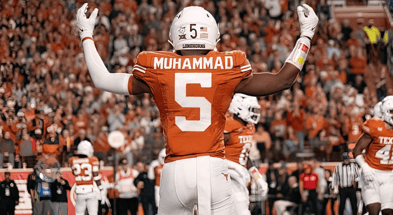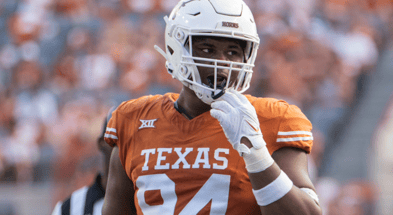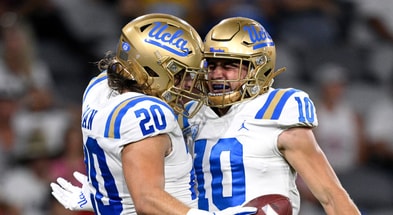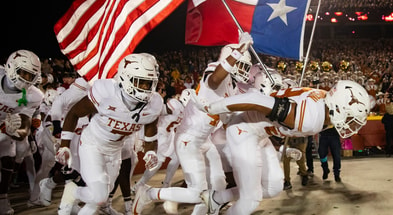[caption id="attachment_31275" align="alignleft" width="300"]

2016 NCAA Tournament West Regional bracket. [/caption]
Like all 6 seeds, the Longhorns are a team simultaneously filled with both talent and flaws. Promise and ability? Texas has those. Inconsistency and lapses of weak execution? Texas has those as well.
The question, now, is whether or not the other teams in the region have the personnel/system to exploit Texas at its worst and withstand Texas at its best.
Generally Speaking
There's a relative formula for attacking this Longhorn squad that has been, generally speaking, tried and true this season. Guard penetration + lengthy, skilled wings + interior rebounding = a tough matchup for Texas.
Now, that's been more so true since Ridley's absence as the Longhorns have been forced to play significant minutes without Ridley's offensive and defensive talents, but the fact remains that Texas has had to play small because their pieces were small (Felix at 20+ minutes at the 2; Mack at 8+ minutes at the four; Holland 10+ minutes at the 3; etc.) and those extended minutes have caused Texas problems with staying in front of dribble penetration and initiating offense in the half court while also struggling to keep their opponents off the offensive glass.
Specifically
1: Oregon
Penetrating Guard: yes. All of Brooks, Cook, Dorsey and Benson have the playmaking ability to create offense into the lane off of the bounce.
Lengthy, Skilled Wings: yes. Brooks (6'5), Cook (6'6), Dorsey (6'4) and Benson (6'3) all played 29 minutes per game or more in conference on a team that was top 25 in the country in turnovers forced and top 50 in the country in points per game.
Interior Rebounding: ehh. What Oregon gains in length on the wings, they give up on interior size and rebounding prowess. This forces them to play as a team rebounding unit without any plus rebounders in the paint.
Matchup for Texas: Tough but possible.
2. Oklahoma
Penetrating Guard: no. Oklahoma's perimeter strength is in their outside shooting. If anything, Texas would prefer OU's guards to attack the lane as that's resulted in more turnovers for the Sooners than it has positive play in the lane (Hield's last five minutes in Norman notwithstanding).
Lengthy, Skilled Wings: ehh. Hield, Cousins, Buford and James all have plus length for their spots, but none of them are lockdown, two way players who excel at both ends.
Interior Rebounding: ehh. Spangler's very good, but Lattin is more of an Ibeh than a Ridley on the glass. Otherwise, OU is heavily dependent on their guards for rebounding, which makes them vulnerable.
Matchup for Texas: Favorable (relatively)
3. Texas A&M
Penetrating Guard: yes. Caruso and Collins can get into the lane and all of House, Jones and Davis are capable players with the ball in one-on-one situations.
Lengthy, Skilled Wings: yes. Caruso (6'5), House (6'7), Hogg (6'7), Jones (6'8) and Gilder (6'3) all have good to very good length as shooters and ball handlers. Their defense is exploitable, however, so this isn't a slam dunk for the Aggies.
Interior Rebounding: ehh. It's Jones and Davis and, then, everybody else.
Matchup for Texas: Tough but possible.
4. Duke
Penetrating Guard: yes. There aren't many guards as multifaceted and skilled as Allen and Igram is even more gifted as a playmaking forward.
Lengthy, Skilled Wings: yes. Allen (6'4), Jones (6'5), Kennard (6'5) and Ingram (6'9) all have plus size and ability on offense. Defensively, Duke is nothing special.
Interior Rebounding: ehh. If Jefferson hadn't gotten hurt, this would have been a definite. But Plumlee, Ingram and Allen are their only passable rebounders.
Matchup for Texas: Favorable
5. Baylor
Penetrating Guard: yes.
Lengthy, Skilled Wings: yes.
Interior Rebounding: yes.
Matchup for Texas: Tough. Best saving grace could be Ridley if he returns at a level where he can give 15+ minutes of quality.
7. Oregon State
Penetrating Guard: yes. Payton is the real deal as a playmaker and athlete. In a lot of ways, he's their offense. But if you're going to have a one-man system, Payton's a damn good one to build around.
Lengthy, Skilled Wings: ehh. Payton's a fantastic defender (6'3), but both Thompson and Tinkle are flawed as defenders and are more off ball players on offense.
Interior Rebonding: no. Again, it's Payton and then a bunch of average pieces.
Matchup for Texas: Favorable, especially considering it would be in the Sweet Sixteen
8. St. Joseph's
Penetrating Guard: ehh. Bembry and Newkirk are capable ball handlers and can get into the lane, but neither are true, playmaking guards off the bounce.
Lengthy, Skilled Wings: yes. Bembry, Demery, Oliva, Brown and Miles all can play on both ends of the floor and are 6'5" or above.
Interior Rebounding: ehh. The Hawks are dependent on their wings for rebounding and lack a true, interior presence on either side of the floor.
Matchup for Texas: Favorable.
10. VCU
Penetrating Guard: ehh. Lewis is solid, but the Rams are dependent on their defense for their offense more so than getting playmaking out of their ball handlers in the half court.
Lengthy, Skilled Wings: ehh. They'll get after teams in their Havoc looks, but they don't have any dominant, big wings who go both ways.
Interior Rebounding: ehh. They play fast, so that helps them with their ability to find rebounding spacing because of the open nature of their style of play, but they don't have any great individual rebounders.
Matchup for Texas: Tougher for the emotional quotient than the basketball quotient.
The Rest
We'll have our UNI preview coming up on Thursday (they're plenty good). The rest of the teams (Cincinnati, Yale, Green Bay, CSU Bakersfield), I really don't expect Texas to play and, should Texas play them, that would likely be very good news for the Horns.
 2016 NCAA Tournament West Regional bracket. [/caption]
Like all 6 seeds, the Longhorns are a team simultaneously filled with both talent and flaws. Promise and ability? Texas has those. Inconsistency and lapses of weak execution? Texas has those as well.
The question, now, is whether or not the other teams in the region have the personnel/system to exploit Texas at its worst and withstand Texas at its best.
Generally Speaking
There's a relative formula for attacking this Longhorn squad that has been, generally speaking, tried and true this season. Guard penetration + lengthy, skilled wings + interior rebounding = a tough matchup for Texas.
Now, that's been more so true since Ridley's absence as the Longhorns have been forced to play significant minutes without Ridley's offensive and defensive talents, but the fact remains that Texas has had to play small because their pieces were small (Felix at 20+ minutes at the 2; Mack at 8+ minutes at the four; Holland 10+ minutes at the 3; etc.) and those extended minutes have caused Texas problems with staying in front of dribble penetration and initiating offense in the half court while also struggling to keep their opponents off the offensive glass.
Specifically
1: Oregon
Penetrating Guard: yes. All of Brooks, Cook, Dorsey and Benson have the playmaking ability to create offense into the lane off of the bounce.
Lengthy, Skilled Wings: yes. Brooks (6'5), Cook (6'6), Dorsey (6'4) and Benson (6'3) all played 29 minutes per game or more in conference on a team that was top 25 in the country in turnovers forced and top 50 in the country in points per game.
Interior Rebounding: ehh. What Oregon gains in length on the wings, they give up on interior size and rebounding prowess. This forces them to play as a team rebounding unit without any plus rebounders in the paint.
Matchup for Texas: Tough but possible.
2. Oklahoma
Penetrating Guard: no. Oklahoma's perimeter strength is in their outside shooting. If anything, Texas would prefer OU's guards to attack the lane as that's resulted in more turnovers for the Sooners than it has positive play in the lane (Hield's last five minutes in Norman notwithstanding).
Lengthy, Skilled Wings: ehh. Hield, Cousins, Buford and James all have plus length for their spots, but none of them are lockdown, two way players who excel at both ends.
Interior Rebounding: ehh. Spangler's very good, but Lattin is more of an Ibeh than a Ridley on the glass. Otherwise, OU is heavily dependent on their guards for rebounding, which makes them vulnerable.
Matchup for Texas: Favorable (relatively)
3. Texas A&M
Penetrating Guard: yes. Caruso and Collins can get into the lane and all of House, Jones and Davis are capable players with the ball in one-on-one situations.
Lengthy, Skilled Wings: yes. Caruso (6'5), House (6'7), Hogg (6'7), Jones (6'8) and Gilder (6'3) all have good to very good length as shooters and ball handlers. Their defense is exploitable, however, so this isn't a slam dunk for the Aggies.
Interior Rebounding: ehh. It's Jones and Davis and, then, everybody else.
Matchup for Texas: Tough but possible.
4. Duke
Penetrating Guard: yes. There aren't many guards as multifaceted and skilled as Allen and Igram is even more gifted as a playmaking forward.
Lengthy, Skilled Wings: yes. Allen (6'4), Jones (6'5), Kennard (6'5) and Ingram (6'9) all have plus size and ability on offense. Defensively, Duke is nothing special.
Interior Rebounding: ehh. If Jefferson hadn't gotten hurt, this would have been a definite. But Plumlee, Ingram and Allen are their only passable rebounders.
Matchup for Texas: Favorable
5. Baylor
Penetrating Guard: yes.
Lengthy, Skilled Wings: yes.
Interior Rebounding: yes.
Matchup for Texas: Tough. Best saving grace could be Ridley if he returns at a level where he can give 15+ minutes of quality.
7. Oregon State
Penetrating Guard: yes. Payton is the real deal as a playmaker and athlete. In a lot of ways, he's their offense. But if you're going to have a one-man system, Payton's a damn good one to build around.
Lengthy, Skilled Wings: ehh. Payton's a fantastic defender (6'3), but both Thompson and Tinkle are flawed as defenders and are more off ball players on offense.
Interior Rebonding: no. Again, it's Payton and then a bunch of average pieces.
Matchup for Texas: Favorable, especially considering it would be in the Sweet Sixteen
8. St. Joseph's
Penetrating Guard: ehh. Bembry and Newkirk are capable ball handlers and can get into the lane, but neither are true, playmaking guards off the bounce.
Lengthy, Skilled Wings: yes. Bembry, Demery, Oliva, Brown and Miles all can play on both ends of the floor and are 6'5" or above.
Interior Rebounding: ehh. The Hawks are dependent on their wings for rebounding and lack a true, interior presence on either side of the floor.
Matchup for Texas: Favorable.
10. VCU
Penetrating Guard: ehh. Lewis is solid, but the Rams are dependent on their defense for their offense more so than getting playmaking out of their ball handlers in the half court.
Lengthy, Skilled Wings: ehh. They'll get after teams in their Havoc looks, but they don't have any dominant, big wings who go both ways.
Interior Rebounding: ehh. They play fast, so that helps them with their ability to find rebounding spacing because of the open nature of their style of play, but they don't have any great individual rebounders.
Matchup for Texas: Tougher for the emotional quotient than the basketball quotient.
The Rest
We'll have our UNI preview coming up on Thursday (they're plenty good). The rest of the teams (Cincinnati, Yale, Green Bay, CSU Bakersfield), I really don't expect Texas to play and, should Texas play them, that would likely be very good news for the Horns.
2016 NCAA Tournament West Regional bracket. [/caption]
Like all 6 seeds, the Longhorns are a team simultaneously filled with both talent and flaws. Promise and ability? Texas has those. Inconsistency and lapses of weak execution? Texas has those as well.
The question, now, is whether or not the other teams in the region have the personnel/system to exploit Texas at its worst and withstand Texas at its best.
Generally Speaking
There's a relative formula for attacking this Longhorn squad that has been, generally speaking, tried and true this season. Guard penetration + lengthy, skilled wings + interior rebounding = a tough matchup for Texas.
Now, that's been more so true since Ridley's absence as the Longhorns have been forced to play significant minutes without Ridley's offensive and defensive talents, but the fact remains that Texas has had to play small because their pieces were small (Felix at 20+ minutes at the 2; Mack at 8+ minutes at the four; Holland 10+ minutes at the 3; etc.) and those extended minutes have caused Texas problems with staying in front of dribble penetration and initiating offense in the half court while also struggling to keep their opponents off the offensive glass.
Specifically
1: Oregon
Penetrating Guard: yes. All of Brooks, Cook, Dorsey and Benson have the playmaking ability to create offense into the lane off of the bounce.
Lengthy, Skilled Wings: yes. Brooks (6'5), Cook (6'6), Dorsey (6'4) and Benson (6'3) all played 29 minutes per game or more in conference on a team that was top 25 in the country in turnovers forced and top 50 in the country in points per game.
Interior Rebounding: ehh. What Oregon gains in length on the wings, they give up on interior size and rebounding prowess. This forces them to play as a team rebounding unit without any plus rebounders in the paint.
Matchup for Texas: Tough but possible.
2. Oklahoma
Penetrating Guard: no. Oklahoma's perimeter strength is in their outside shooting. If anything, Texas would prefer OU's guards to attack the lane as that's resulted in more turnovers for the Sooners than it has positive play in the lane (Hield's last five minutes in Norman notwithstanding).
Lengthy, Skilled Wings: ehh. Hield, Cousins, Buford and James all have plus length for their spots, but none of them are lockdown, two way players who excel at both ends.
Interior Rebounding: ehh. Spangler's very good, but Lattin is more of an Ibeh than a Ridley on the glass. Otherwise, OU is heavily dependent on their guards for rebounding, which makes them vulnerable.
Matchup for Texas: Favorable (relatively)
3. Texas A&M
Penetrating Guard: yes. Caruso and Collins can get into the lane and all of House, Jones and Davis are capable players with the ball in one-on-one situations.
Lengthy, Skilled Wings: yes. Caruso (6'5), House (6'7), Hogg (6'7), Jones (6'8) and Gilder (6'3) all have good to very good length as shooters and ball handlers. Their defense is exploitable, however, so this isn't a slam dunk for the Aggies.
Interior Rebounding: ehh. It's Jones and Davis and, then, everybody else.
Matchup for Texas: Tough but possible.
4. Duke
Penetrating Guard: yes. There aren't many guards as multifaceted and skilled as Allen and Igram is even more gifted as a playmaking forward.
Lengthy, Skilled Wings: yes. Allen (6'4), Jones (6'5), Kennard (6'5) and Ingram (6'9) all have plus size and ability on offense. Defensively, Duke is nothing special.
Interior Rebounding: ehh. If Jefferson hadn't gotten hurt, this would have been a definite. But Plumlee, Ingram and Allen are their only passable rebounders.
Matchup for Texas: Favorable
5. Baylor
Penetrating Guard: yes.
Lengthy, Skilled Wings: yes.
Interior Rebounding: yes.
Matchup for Texas: Tough. Best saving grace could be Ridley if he returns at a level where he can give 15+ minutes of quality.
7. Oregon State
Penetrating Guard: yes. Payton is the real deal as a playmaker and athlete. In a lot of ways, he's their offense. But if you're going to have a one-man system, Payton's a damn good one to build around.
Lengthy, Skilled Wings: ehh. Payton's a fantastic defender (6'3), but both Thompson and Tinkle are flawed as defenders and are more off ball players on offense.
Interior Rebonding: no. Again, it's Payton and then a bunch of average pieces.
Matchup for Texas: Favorable, especially considering it would be in the Sweet Sixteen
8. St. Joseph's
Penetrating Guard: ehh. Bembry and Newkirk are capable ball handlers and can get into the lane, but neither are true, playmaking guards off the bounce.
Lengthy, Skilled Wings: yes. Bembry, Demery, Oliva, Brown and Miles all can play on both ends of the floor and are 6'5" or above.
Interior Rebounding: ehh. The Hawks are dependent on their wings for rebounding and lack a true, interior presence on either side of the floor.
Matchup for Texas: Favorable.
10. VCU
Penetrating Guard: ehh. Lewis is solid, but the Rams are dependent on their defense for their offense more so than getting playmaking out of their ball handlers in the half court.
Lengthy, Skilled Wings: ehh. They'll get after teams in their Havoc looks, but they don't have any dominant, big wings who go both ways.
Interior Rebounding: ehh. They play fast, so that helps them with their ability to find rebounding spacing because of the open nature of their style of play, but they don't have any great individual rebounders.
Matchup for Texas: Tougher for the emotional quotient than the basketball quotient.
The Rest
We'll have our UNI preview coming up on Thursday (they're plenty good). The rest of the teams (Cincinnati, Yale, Green Bay, CSU Bakersfield), I really don't expect Texas to play and, should Texas play them, that would likely be very good news for the Horns. 